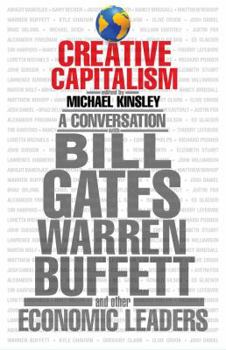Creative Capitalism: A Conversation with Bill Gates, Warren Buffett, and Other Economic Leaders
Select Format
Select Condition 
Book Overview
Bill Gates is more than the world's most successful capitalist; he's also the world's biggest philanthropist.Gates has approached philanthropy the same way he revolutionized computer software: with a fierce ambition to change the rules of the game. That's why at the 2008 annual meeting of the World Economic Forum in Davos, Switzerland, Gates advocated a creative capitalism in which big corporations, the distinguishing feature of the modern global...
Format:Hardcover
Language:English
ISBN:141659941X
ISBN13:9781416599418
Release Date:December 2008
Publisher:Simon & Schuster
Length:315 Pages
Weight:0.97 lbs.
Dimensions:1.0" x 6.2" x 8.7"
Customer Reviews
2 ratings
Outstanding!
Published by Thriftbooks.com User , 15 years ago
In 2008 Bill Gates advocated that big corporations integrate doing good into their way of doing business. "Creative Capitalism" begins with that proposal, and follows with a number of individual comments, both pro and con. Gates points out that capitalism harnesses self-interest in helpful and sustainable ways, but only on behalf of those who can pay. Profits are not always possible when business tries to serve the very poor. Thus, there needs to be another market-based incentive - recognition. Recognition enhances a company's reputation and appeals to customers; it also attracts good people to the organization. Potential Creative Capitalism Mechanisms: Tiered pricing (eg. for vaccines used in both the developed and third world) is one existing mechanism. Priority for approval reviews of a for-profit drug can be offered to companies that also develop a new drug for a neglected disease such as malaria. Warren Buffett, normally a strong Gates supporter, however, had other perspectives. He pointed out that emotional public reactions can be a problem - eg. donations to pro-choice efforts. Further, corporations donating a specified percentage of profits/revenues to "cause X" are only successful in the short run, though they do raise awareness. Michael Kinsley raises other problems. Eg. giving priority in new drug approval reviews begs the question of "Why the delay to start with?" Perhaps it is due to important cautionary concerns; or, it simply may reflect a need for an improved review process or the need for greater funding. Then there's the manipulation potential - eg. ExxonMobil spent 3X as much publicizing its support for Masterpiece Theater as it did for the actual support. Others asserted that Gates' ideal only works where there are sustainable (protected) profits - eg. new product, monopoly, etc.; that there aren't that many products with a unique demand in Third-World vs. developed countries (probably literally true, though the former's emphasis on extremely low-cost can also be construed as constituting unique products); that business already has an incentive to help the poor via seeking out low-cost producers (eg. China); that "Corporate Social Responsibility" people are typically woolly-headed and ineffectual; that foreign charity can reduce the pressure for good government in poor countries; and that businesses should instead stop trying to circumvent markets working well via tariffs, quotas, subsidies, etc. Larry Summers' also had an interesting insight. Wanting to harness the profit motive to meet the social objective of increased home-ownership, Fannie Mae and Freddie Mac were employed. The illusion that they were doing virtuous work made it impossible to build a political case for serious regulation. On the other hand, market discipline as nearly non-existent given the perception that their debt was government-backed. Meanwhile, complaints of social failures were met by claims of a need to perform for shareholde
Creative Capitalism-A creative way to express diverse views
Published by Thriftbooks.com User , 15 years ago
Timely subject. Excellent collection of differing points of view from people that should know.A quick and provactive read.
Creative Capitalism: A Conversation with Bill Gates, Warren Buffet, and Other Economic Leaders Mentions in Our Blog

How Do Books Make Life Better? Let Us Count the Ways...
Published by Beth Clark • January 07, 2019
Aside from the obvious self-help category, books make life better in so many ways that it's hard to imagine existing without them...so we won'! Thankfully, we don't have to. Here are just some of the ways that reading books is as essential as, oh, breathing.






